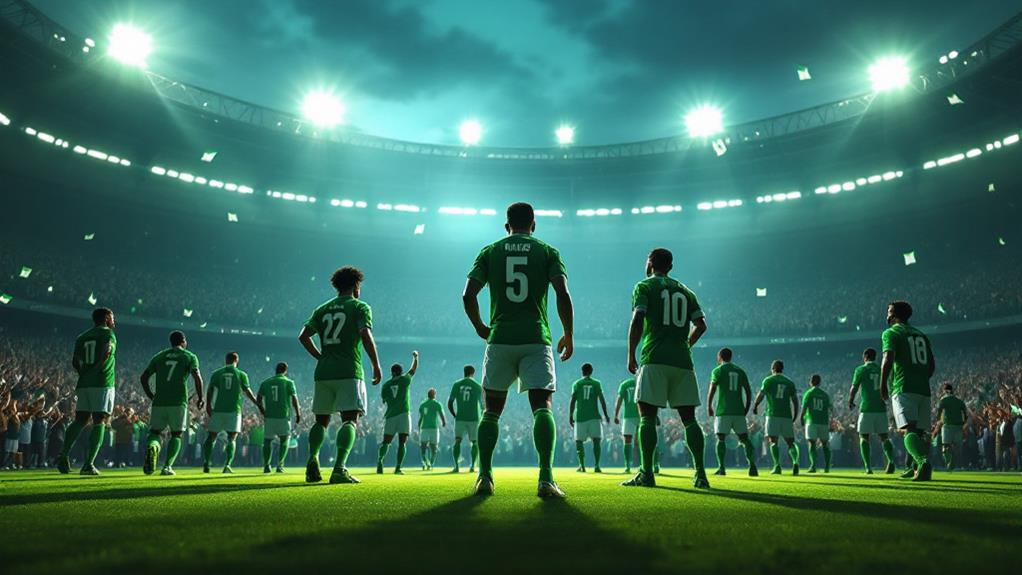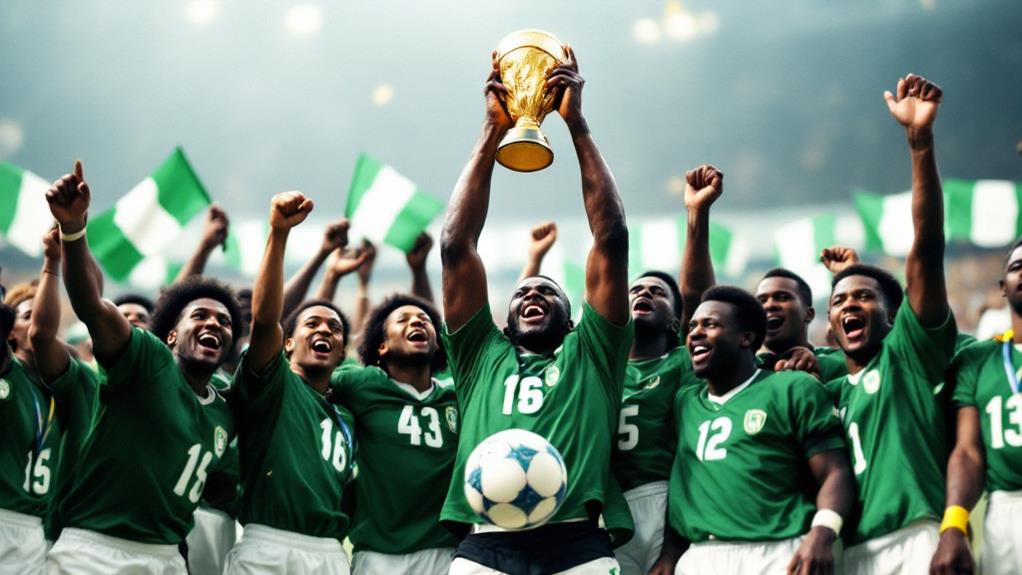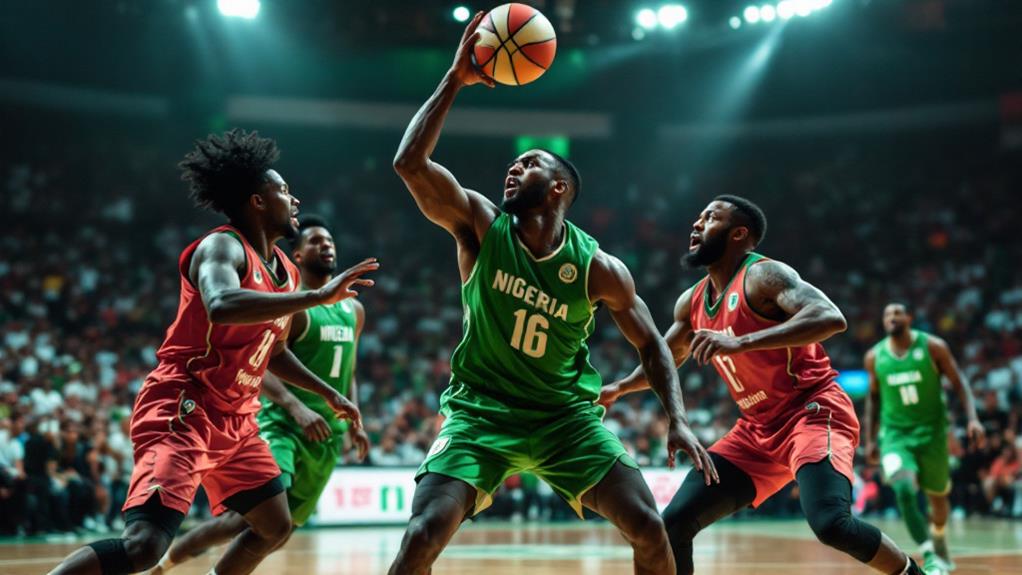Nigerian Football Legends: The Icons Who Shaped the Nation's Soccer Legacy

Nigerian football legends have left an everlasting mark on the nation's soccer legacy. From early pioneers to the Golden Generation, these icons have shaped Nigeria's footballing identity. You'll discover legendary strikers like Rashidi Yekini and Nwankwo Kanu, midfield maestros like Sunday Oliseh and Jay-Jay Okocha, and defensive stalwarts like Christian Chukwu. The Super Eagles' Olympic triumph in 1996 and impressive World Cup performances have solidified Nigeria's status as a football juggernaut. Women's football trailblazers and influential coaches have further augmented this legacy. Nigerian football's global impact extends beyond the pitch, inspiring national fervor and cultural unity. Exploring these legends' stories will reveal the true essence of Nigerian soccer greatness.
Early Pioneers of Nigerian Football
The dawn of Nigerian football can be traced back to the early 20th century when British colonizers introduced the sport to the West African nation. In 1904, you'd have witnessed the first recorded match, marking the beginning of a rich football history that would shape the country's future.
As you investigate Nigerian football's roots, you'll uncover that the sport quickly gained popularity, intertwining with nationalist movements. Figures like Nnamdi Azikiwe recognized football's potential to inspire political freedom, using it as a tool in the fight for independence.
By the 1950s, football had become Nigeria's national game, enthralling hearts across the country. The early pioneers laid the foundation for what would become a powerhouse in African football. These trailblazers established the first Nigerian clubs, nurturing local talent and encouraging a deep-rooted passion for the sport.
Their efforts paved the way for the creation of the Nigerian national team, the Super Eagles, who'd go on to dominate continental competitions. The legacy of these early pioneers continues to influence Nigerian football today, inspiring generations of players and fans alike.
The Golden Generation
Building on the foundation laid by early pioneers, Nigerian football reached its zenith in the mid-1990s with the emergence of the "Golden Generation." You'd be hard-pressed to find a more talented group of players in African football history. This era was defined by the iconic "Dream Team" that clinched gold at the 1996 Olympics, defeating Argentina 3-2 in a thrilling final.
The team's success wasn't just about raw talent; it was their tactical flexibility and cohesion that set them apart. Players like Nwankwo Kanu, Jay Jay Okocha, and Daniel Amokachi became household names, inspiring a new generation of Nigerian footballers. Their electrifying performances, including a memorable 4-3 victory over Brazil in the semi-finals, enthralled audiences worldwide.
Beyond the Olympics, this generation continued to shine in the African Cup of Nations and other international competitions. Their achievements brought a sense of national self-assurance and unity during a challenging political period in Nigeria. The personal accounts of these players emphasize the lasting impact of their success, cementing their place in Nigerian football history and elevating the country's status as a powerhouse in African football.
Olympic Glory and World Cup

Following their Olympic triumph in 1996, Nigeria's football team rode a wave of success and optimism into subsequent World Cup appearances. The "Dream Team's" gold medal victory at the 1996 Olympic Games in Atlanta was a defining moment for Nigerian football, showcasing the country's immense talent on the global stage.
You'll remember how Nigeria's U-23 squad stunned powerhouses Brazil and Argentina en route to claiming the top prize. This noteworthy achievement not only enthralled audiences worldwide but also inspired a new generation of Nigerian footballers. The Super Eagles' entertaining style of play and impressive performances at the Olympics helped cement Nigeria's status as a rising force in international football.
The 1996 Olympic triumph couldn't have come at a better time for the nation. During a period of political turmoil, the Dream Team's success provided a much-needed increase in national pride and unity. This golden moment in Nigerian football history solidified the country's place on the global stage and set the stage for future World Cup appearances. The legacy of the 1996 Olympic victory continues to influence Nigerian football to this day.
Legendary Strikers and Goal Scorers
Precision and power have defined Nigeria's legendary strikers and goal scorers throughout the years. You'll find no better example than Rashidi Yekini, the country's all-time leading goalscorer. His brutally efficient finishing in the 1990s set a standard that's hard to match. Alongside him, Daniel Amokachi's physical prowess and fierce shot made him a formidable attacking force, particularly during the 1994 African Cup of Nations.
You can't discuss Nigerian football legends without mentioning Nwankwo Kanu. His technical brilliance and spatial awareness helped secure Olympic gold in 1996. Segun Odegbami, the second-highest goalscorer, brought versatility to the forward line with his rapid pace and array of finishing techniques.
In recent years, Victor Osimhen has emerged as a rising star. As the 2023 African Footballer of the Year and the highest-scoring African in Serie A history, he's carrying on the legacy of his predecessors. These strikers have not only shaped Nigeria's soccer legacy but have also inspired generations of players to come, each leaving a permanent mark on the nation's footballing history.
Midfield Maestros and Playmakers

Nigeria's midfield generals have orchestrated some of the country's greatest footballing triumphs. You'll find Sunday Oliseh's defensive prowess and tactical acumen at the heart of Nigeria's 1996 Olympic gold medal victory. His ability to control the game from deep positions allowed more creative players to flourish.
Speaking of creativity, you can't overlook Muda Lawal's versatility and exceptional passing. He's the only Nigerian to score in two African Cup of Nations finals, showcasing his impact on both ends of the pitch. John Mikel Obi continued this tradition of midfield excellence, leading Nigeria to the 2013 African Cup of Nations title with his composed play and leadership.
Nwankwo Okobi's defensive coverage and game control were essential in allowing his more attack-minded teammates to shine. His contributions often went unnoticed but were indispensable to the team's success.
Defensive Stalwarts and Goalkeepers
Defensive prowess has been a hallmark of Nigerian football, with several players establishing themselves as true stalwarts at the back. You'll find Christian Chukwu at the top of this list, widely regarded as one of Nigeria's finest center-backs. His exceptional skills as a sweeper, combined with his tackling, anticipation, and passing abilities, made him a formidable presence on the pitch.
In goal, you can't overlook Vincent Enyeama's contributions. He's not only Nigeria's record holder for consecutive international clean sheets but also earned the title of Best African Goalkeeper Of All Time from IFFHS. Joseph Yobo, another defensive icon, earned the nickname "Mr. Reliable" with his 101 appearances for the national team, including three World Cups and six Africa Cup of Nations tournaments.
While primarily known for his midfield exploits, Sunday Oliseh's defensive acumen was pivotal in Nigeria's 1996 Olympic gold medal victory. Similarly, Nwankwo Okobi's intelligent gameplay and ability to read matches provided the defensive cover that allowed creative players to flourish. These legends have set the bar high for future generations of Nigerian defenders and goalkeepers.
Women's Football Trailblazers

While Nigerian men's football has long captured the spotlight, women's football in the country has carved out its own outstanding legacy. The Super Falcons, Nigeria's women's national team, have been a dominant force in African football and a consistent presence on the global stage.
You'll find that the Super Falcons have qualified for every FIFA Women's World Cup since its inception, showcasing their enduring excellence. They've also dominated the CAF Women's Championship, winning the first seven editions before their streak ended in 2008.
Among the trailblazers who've shaped this vital legacy are Mercy Akide, Maureen Mmadu, and Perpetua Nkwocha. These players have not only excelled on the field but have also inspired a new generation of female athletes across Nigeria.
The success of the Super Falcons has played a pivotal role in advancing women's football in the country. It's paved the way for greater participation and recognition in the sport, strengthening female athletes and challenging societal norms. As a result, Nigeria continues to produce world-class players who compete at the highest levels of international competition, cementing the country's status as a powerhouse in women's football.
Coaching Legacies and Leadership
Behind every successful team stands a visionary leader, and Nigerian football has been shaped by some of the most influential coaches in the sport's history. These legends have left an indelible mark on the nation's soccer legacy, transforming the Super Eagles into a formidable force on the African continent.
Stephen Keshi's trailblazing achievement as the first Nigerian to win the Africa Cup of Nations as both player and manager solidified his iconic status. Clemens Westerhof's tactical prowess and disciplinary approach revolutionized the national team, leading them to glory in 1994. Samson Siasia's coaching contributions, including Olympic gold and Africa Cup of Nations success, showcase his ability to nurture talent across various levels.
Christian Chukwu's managerial stint in the 1980s, culminating in the 1980 Africa Cup of Nations victory, cemented his place in Nigerian football history. Sunday Oliseh's shift from player to coach demonstrated his tactical acumen and commitment to youth development.
These coaching legends have:
- Implemented innovative strategies
- Instilled discipline and professionalism
- Nurtured young talent
- Elevated Nigeria's status in international football
Their leadership has not only brought silverware but also inspired generations of players and coaches, ensuring a lasting legacy in Nigerian football.
Global Impact and Cultural Influence

Nigerian football's global impact has surpassed the boundaries of sport, becoming a cultural phenomenon that unites millions. The Super Eagles, Nigeria's national team, have become a symbol of national exaltation, transcending ethnic and religious divides. Their success on the international stage, including World Cup appearances and African Cup of Nations victories, has inspired a sense of African solidarity and empowerment.
You've witnessed Nigerian footballers like Nwankwo Kanu, Jay-Jay Okocha, and Victor Osimhen make their mark on the global stage, elevating the country's profile and inspiring a new generation of African athletes. Their unique playing style, characterized by technical skill, flair, and creativity, has influenced the game worldwide, with stars like Finidi George and Segun Odegbami earning widespread admiration.
The popularity of the English Premier League among Nigerian fans has further strengthened cultural ties between Nigeria and the international football milieu. Clubs like Chelsea, Manchester United, and Arsenal command a large and passionate following in the country. This connection has not only augmented Nigeria's presence in the global football community but also cultivated a shared passion that bridges continents and cultures.


